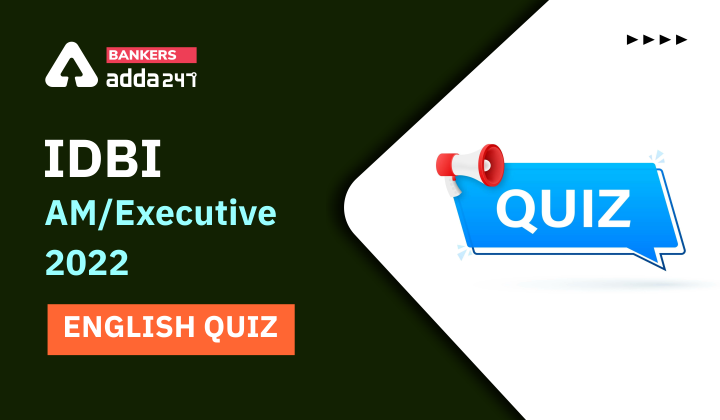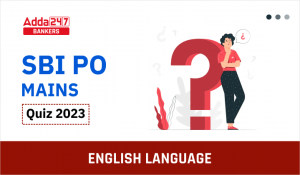
TOPIC: Miscellaneous
Directions (1-5): In each of the following
sentences, a part of the sentence is bold. Below are given alternatives to the highlighted
part which may improve the sentence. Choose the correct alternative. Where no
improvement is needed choose ‘No correction required’ as the answer.
Q1. We have
profound faith and hopes for the
future.
(a) faith
for also hopes for
(b) faith in
and hopes for
(c) faiths
and hopes for
(d) faith
about and hopes in
(e) No
correction required
Q2. They
can’t decide who should they blame for
inefficiency.
(a) whom
they should blame for
(b) whom should
they be blamed for
(c) whom
should they blame on
(d) whom
should they blame for
(e) No
correction required
Q3. Guests
must register at the front desk; otherwise, they don’t obtain a key.
(a) will not
obtain
(b) don’t
obtained
(c) cannot
obtained
(d) can
obtain not
(e) No
correction required
Q4. Emission
controls were created to eliminate or at
least reduction in air pollution.
(a) at least
reduce
(b) to
reduce in the least
(c) for
reducing in the
(d) to at
least reduction in
(e) No
correction required
Q5. Because
certain scientific theories are contradicting
at peoples’ religious beliefs, they
are reluctant to accept them.
(a)
contracting to
(b)
contracting with
(c)
conflicting for
(d) contrary
to
(e) No
correction required
Directions (6-10): Rearrange the following six sentences
(A), (B), (C), (D), (E) and (F) in the proper sequence to form a meaningful
paragraph; then answer the questions given below them.
(A) “It is possible” said the courtier pensively.
(B) “But I don’t understand how he can be the
noblest.”, said the Emperor
(C) The Emperor asked one of his courtier’s if
it was possible for a man to be the ‘lowest’ and the ‘noblest’ at the same
time.
(D) “He has been given the honour of an audience
with the Emperor. That makes him the noblest among all beggars.” said the
courtier.
(E) The courtier returned with a beggar. “He is
the lowest among your Subjects” he said to the Emperor.
(F) The Emperor then requested that such a
person be brought to him.
Q6. Which of the following should be the FIRST sentence after the rearrangement?
(a) C
(b) D
(c) F
(d) A
(e) E
Q7. Which of the following should be the SECOND sentence after the rearrangement?
(a) B
(b) C
(c) E
(d) A
(e) F
Q8. Which of the following should be the FOURTH sentence after the rearrangement?
(a) A
(b) E
(c) B
(d) F
(e) D
Q9. Which of the following should be the FIFTH sentence after the rearrangement?
(a) A
(b) D
(c) C
(d) B
(e) E
Q10. Which of the following should be the SIXTH
(LAST) sentence
after the rearrangement?
(a) F
(b) B
(c) C
(d) E
(e) D
Directions (11-15): The Following
questions have two blanks, each blank indicating that something has been
omitted. Choose the set of words for each blank that best fits the meaning of
the sentence as a whole.
Q11. The raging __________ over the issue has
__________ the media as well as the politicians into warring camps.
(a)
saga, compelled
(b)
debate, divided
(c)
concern, ignited
(d)
dust, gathered
(e)
dilemma, sensitised
Q12.
The flexibility of the distance learning system is __________ in designing
courses which are socially __________ and technically up-to-date.
(a)
helpful, relevant
(b)
basically, viable
(c)
providing, feasible
(d)
informative, wide
(e)
supportive, challenging
Q13. _________after Darwin put
forth his theory of evolution, his cousin Sir Francis Galton began to ________the implications.
(a) Soon,
bring down
(b) Only,
take up
(c) Not,
write down
(d) Shortly, draw out
(e) Nearly,
think about
Q14. __________ means of communication must be
used to __________ the message of gender equality.
(a)
Subtle, spread
(b)
Sufficient, create
(c)
Proper, aware
(d)
Distinct, avoid
(e)
Efficient, avails
Q15.
Archaeology is a poor profession; only ____ sums are available for
excavating sites and even more ____ amounts for preserving the excavations.
(a) paltry, meager
(b) miniscule, substantial
(c) average, augmented
(d) judicious, penurious
(e) modest, generous
SOLUTIONS:
S1. (b)
Sol. If the nouns need different prepositions, all the
required preposition must be used. After ‘faith’, ‘in’ is to be used.
S2. (a)
Sol. ‘Who’ is an
interrogative and a relative pronoun meaning ‘what person or people’. But
‘whom’ is the objective case of ‘who’, used as a direct or indirect object,
e.g., whom did you call? As the sentence is declarative, the word order is
‘they should’ and not ‘should they’.
S3. (e)
Sol. No correction required.
S4. (a)
Sol. Parallel construction requires the verb ‘reduce’ to go
with ‘eliminate’. Option (b) has ‘in the least’ which makes no sense in the
context of the sentence.
S5. (d)
Sol. It is preferable to use simple present or past in such
sentence conveying a general fact or view. The use of a continuous tense needs
to be avoided as no action is being continually performed.
S6. Ans. (a)
Sol. The sequence of the paragraph is CFEBAD.
S7. Ans. (e)
Sol. The sequence of the paragraph is CFEBAD.
S8. Ans. (c)
Sol. The sequence of the paragraph is CFEBAD.
S9. Ans. (a)
Sol. The sequence of the paragraph is CFEBAD.
S10. Ans. (e)
Sol. The sequence of the paragraph is CFEBAD.
S11.Ans.(b)
Sol.
Debate means to
argue about (a subject), especially in a formal manner.
S12.Ans.(a)
Sol.
Relevant means
closely connected or appropriate to the matter in hand.
S13.Ans.(d)
Sol.
‘Shortly; Draw out’ is the correct option.
Shortly: in a short time; soon
‘Draw
out ’ means to
elicit (information)
S14.Ans.(a)
Sol.
Subtle meaning making use of clever and indirect methods to
achieve something.
S15.Ans.(a)
Sol.
The part after the semicolon expands upon the first part of
the sentence.
So, since the first part tells us that there is no money in
archaeology, then there will only be small (paltry) amounts for excavating.
Also ‘even more’ indicates that another similar word is required. Thus, meager
also means small.


 English Quizzes For SBI PO Mains 2023 - ...
English Quizzes For SBI PO Mains 2023 - ...










